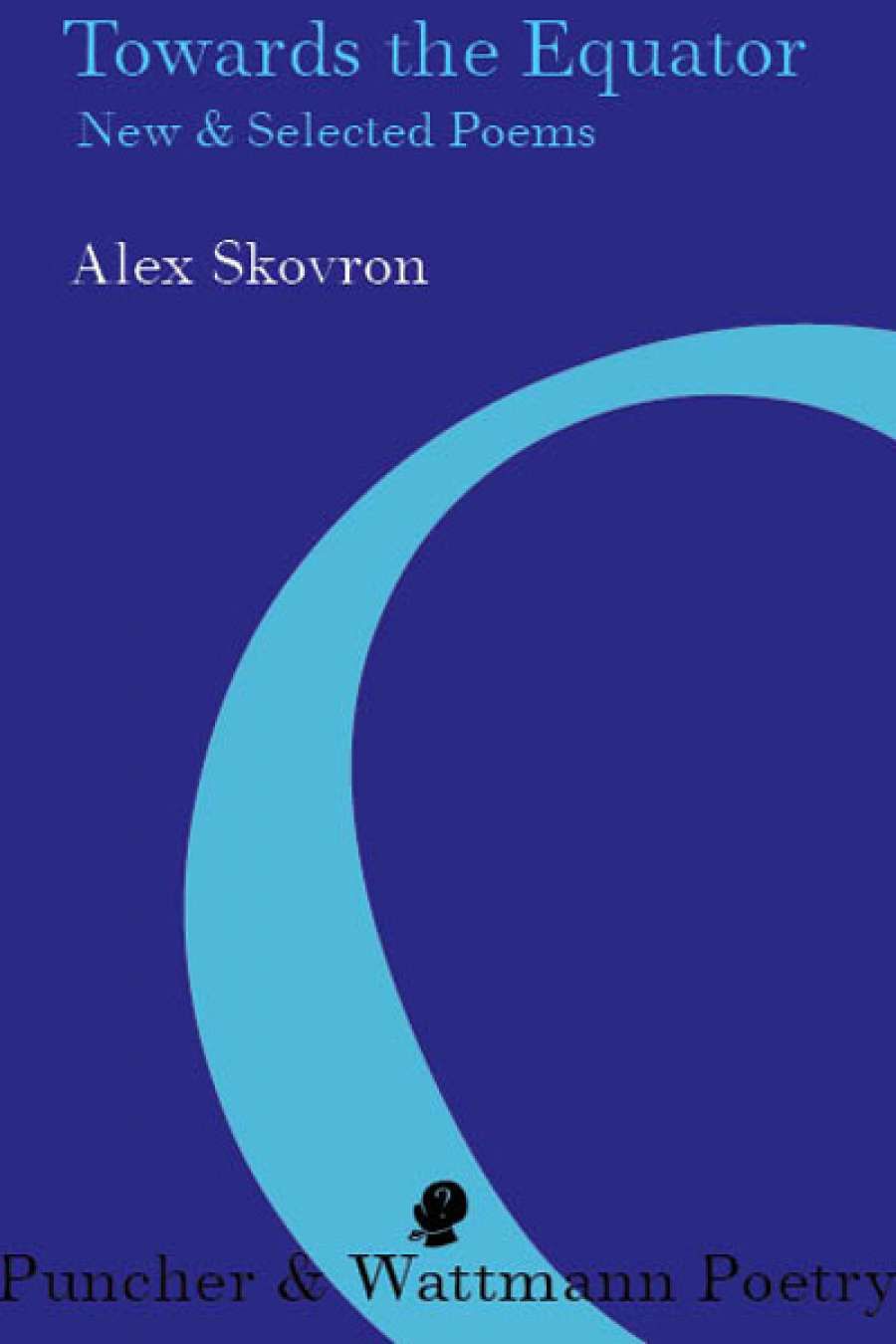
- Free Article: No
- Contents Category: Poetry
- Custom Article Title: Paul Hetherington reviews 'Towards the Equator' by Alex Skovron
- Review Article: Yes
- Online Only: No
- Book 1 Title: Towards the equator
- Book 1 Subtitle: new and selected poems
- Book 1 Biblio: Puncher & Wattman, $29.99 pb, 306 pp, 9781922186553
At times Skovron is reticent. It is as if, no matter what a poem says, he wishes to remain at a respectable distance, passionately implicated in his writing but stepping back from the fray. This is even true of autobiographical works in which he ruminates on his peripatetic childhood in Poland, Israel, and Australia. Additionally, there is an anxiety behind these poems – about how human beings may best understand themselves and shore themselves against entropy and ruin. He returns time and again to the question of how to celebrate cultural achievements despite the ambiguity of their inflections.
For example, he is almost besotted by Mozart and his music, not only writing an evocative sequence of poems about the composer – ‘Sleeve Notes’ – but mentioning him on numerous other occasions. A recent poem comments, ‘For months Mozart has been so crucial I haven’t played him.’ This is both a nice opening of a poem and a recognition that even Mozart’s music cannot always be enough – or, that if it may sometimes be enough, there are other important things besides.
Skovron’s most recent work opens this collection and tends to be sparer than his earliest poems. When he published The Rearrangement (1988), he was a more intricately measured poet than he is today, producing exquisite works that were almost like puzzles in their complexities. His recent work is often artfully simple. For example, Towards the Equator opens with the imagist and opaque ‘Four Nights’, a disquieting poem that begins ‘Somewhere a dog barks, / the shock of splintered glass, / a muffled scream, then / the Adriatic silence.’ Another ‘new’ poem, ‘The Last Word’, points to many of the preoccupations of this volume. It posits a day when ‘the last word was used up’, and the poem’s speaker, representing a larger group, is ‘desperate to locate another’. Instead, the group is consigned to the ‘desolation’ of a world where there is ‘no simile fresh / from the realm of thought, just a melody / circling the unaccustomed dark’.
‘His poems are full of hope – for the future of human culture – and certain kinds of regret – a general regret for human violence and intransigence’
This disturbing vision of the end of civilisation, and of the human species as we know it, points to how dependent we all are on culture and language. In positing the loss of language, and an accompanying loss of meaning and purpose, the poem gestures towards almost every other poem in this volume. It underlines Skovron’s continual, restless, questing scrutiny of what language and culture makes possible – including autobiographical memory, identity, and complexity itself. Skovron’s conjuring of absence points to the rich, interleaved presences in his poetry that continually reference the made things of the world, and which seem almost to rub against them (poetically at least) for reassurance, knowledge, and guidance – and for a sense of how a thoughtful human being may understand himself.
One of the book’s earliest poems – in terms of its publication date – is the arresting ‘A Concise History of the Moon’. This five-part poem is too wide-ranging and complex to fully characterise in a review, but in its precise image-making, ruminative meanderings, and tendency towards abstraction it demonstrates Skovron’s capacity to turn his often self-reflexive art into a kind of bravura performance. Such poetry has something of the intricacy of music as it evokes a ‘blackening future’, a breeze that ‘no longer knows you’, and a world where every built dome ‘is overgrown with tendrils’ amid ‘stasis’. Further, in presenting this problematised vision, Skovron does not tell us everything we may wish to know. The poem tantalises as it suggests that, even in their intimacies, people are never fully knowable, and that key aspects of existence are opaque.
In one poem, Skovron remarks on the ‘treachery of words’, but all his poetry urbanely values the articulate and the clarified; the complex and the made. It asserts the importance of recognising human contradictions and problems while appreciating civilisation. For Skovron, words are so much part of being and doing that the world is unimaginable without them – and music is always there as an abiding and ineffable ‘mysterious song’.


Comments powered by CComment